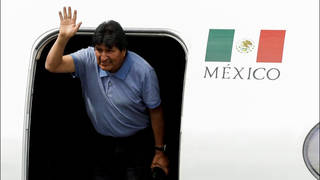A Coup? A Debate on the Political Crisis in Bolivia That Led to Evo Morales's Resignation

In Bolivia, right-wing Senator Jeanine inez declared herself president Tuesday night despite a lack of quorum in Congress, amid a deepening political crisis in the country. Evo Morales, Bolivia's first indigenous president, left the country Monday after being granted asylum in Mexico. Morales announced his resignation Sunday shortly after the Bolivian military took to the airwaves to call for his departure. His Movement Toward Socialism party is refusing to recognize inez as president, calling her claim illegal and decrying Evo Morales's resignation over the weekend as a military coup. Last month, Morales was re-elected for a fourth term in a race his opponents claimed was marred by fraud. He ran for a fourth term after contesting a referendum upholding term limits. On Tuesday, the Organization of American States held an emergency meeting in Washington, where U.S. Ambassador Carlos Trujillo read a statement from President Donald Trump applauding Evo Morales's resignation and warning it should "send a strong signal" to Venezuela and Nicaragua. Mexico, Uruguay, Nicaragua and the president-elect of Argentina have all denounced Morales's departure as a coup. Morales's departure has sparked demonstrations and clashes across Bolivia. We host a debate on the political crisis in Bolivia with Pablo Solon, former ambassador to the United Nations under President Evo Morales until 2011, and Kevin Young, assistant professor of history at the University of Massachusetts at Amherst and the author of "Blood of the Earth: Resource Nationalism, Revolution, and Empire in Bolivia."